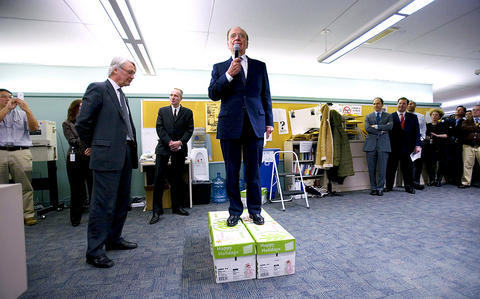Rupert Murdoch has completed his more than US$5 billion deal to acquire Dow Jones & Co, adding the Wall Street Journal to his global media conglomerate News Corp and ending a century of control by the Bancroft family.
The changeover is sure to bring significant changes to the Journal, starting with a new management team that was announced late last week. Longtime News Corp publishing executive Les Hinton will be chief executive, while Robert Thomson, editor of Murdoch's Times newspaper in London, will be publisher. Several Dow Jones executives are departing, including CEO Richard Zannino.
Shareholders approved the deal on Thursday by a margin of 60.3 percent. About 78 percent of the company's publicly traded shares were voted for the deal, while 54 percent of the Class B shares, which are largely held by the Bancrofts, were in favor.

PHOTO: AP
Later on Thursday, Murdoch, Hinton and Thomson addressed several hundred Wall Street Journal reporters in the paper's main newsroom. Murdoch, holding a microphone and standing on top of several boxes of copier paper, told the assembled crowd that he had high hopes for the Journal's future.
"I know that change is often difficult or creates nervousness," Murdoch said, according to a transcript provided by News Corp. "If it's particularly nervousness then certainly let us know. We're very accessible people."
"Our aim is pretty simple," Murdoch said. "We have to entertain, inform, enrich all our readers in their lives and in their businesses. We must be the preeminent source of financial information and comment in the world."
Despite a general malaise affecting many US newspapers, Murdoch has said he sees major potential in Dow Jones with the booming demand worldwide for business news and information. He also intends to beef up the paper's online operations and Washington coverage, and is contemplating changes to the Journal's Web site to further open it up to non-paying subscribers.
The deal places Dow Jones into the fold of News Corp, which also owns the Fox broadcast network, Twentieth Century Fox, Fox News Channel, satellite TV businesses in Europe and Asia, MySpace, as well as a large group of newspapers in Murdoch's native Australia, the UK and the New York Post.
Dow Jones also owns Barron's, Dow Jones Newswires, the Factiva news database, several major stock market indicators including the Dow Jones industrial average, half of SmartMoney magazine and a group of community newspapers, which the company has said it is seeking to sell.

Nvidia Corp yesterday unveiled its new high-speed interconnect technology, NVLink Fusion, with Taiwanese application-specific IC (ASIC) designers Alchip Technologies Ltd (世芯) and MediaTek Inc (聯發科) among the first to adopt the technology to help build semi-custom artificial intelligence (AI) infrastructure for hyperscalers. Nvidia has opened its technology to outside users, as hyperscalers and cloud service providers are building their own cost-effective AI chips, or accelerators, used in AI servers by leveraging ASIC firms’ designing capabilities to reduce their dependence on Nvidia. Previously, NVLink technology was only available for Nvidia’s own AI platform. “NVLink Fusion opens Nvidia’s AI platform and rich ecosystem for

WARNING: From Jan. 1 last year to the end of last month, 89 Taiwanese have gone missing or been detained in China, the MAC said, urging people to carefully consider travel to China Lax enforcement had made virtually moot regulations banning civil servants from making unauthorized visits to China, the Control Yuan said yesterday. Several agencies allowed personnel to travel to China after they submitted explanations for the trip written using artificial intelligence or provided no reason at all, the Control Yuan said in a statement, following an investigation headed by Control Yuan member Lin Wen-cheng (林文程). The probe identified 318 civil servants who traveled to China without permission in the past 10 years, but the true number could be close to 1,000, the Control Yuan said. The public employees investigated were not engaged in national

CAUSE AND EFFECT: China’s policies prompted the US to increase its presence in the Indo-Pacific, and Beijing should consider if this outcome is in its best interests, Lai said China has been escalating its military and political pressure on Taiwan for many years, but should reflect on this strategy and think about what is really in its best interest, President William Lai (賴清德) said. Lai made the remark in a YouTube interview with Mindi World News that was broadcast on Saturday, ahead of the first anniversary of his presidential inauguration tomorrow. The US has clearly stated that China is its biggest challenge and threat, with US President Donald Trump and US Secretary of Defense Pete Hegseth repeatedly saying that the US should increase its forces in the Indo-Pacific region

ALL TOGETHER: Only by including Taiwan can the WHA fully exemplify its commitment to ‘One World for Health,’ the representative offices of eight nations in Taiwan said The representative offices in Taiwan of eight nations yesterday issued a joint statement reiterating their support for Taiwan’s meaningful engagement with the WHO and for Taipei’s participation as an observer at the World Health Assembly (WHA). The joint statement came as Taiwan has not received an invitation to this year’s WHA, which started yesterday and runs until Tuesday next week. This year’s meeting of the decisionmaking body of the WHO in Geneva, Switzerland, would be the ninth consecutive year Taiwan has been excluded. The eight offices, which reaffirmed their support for Taiwan, are the British Office Taipei, the Australian Office Taipei, the